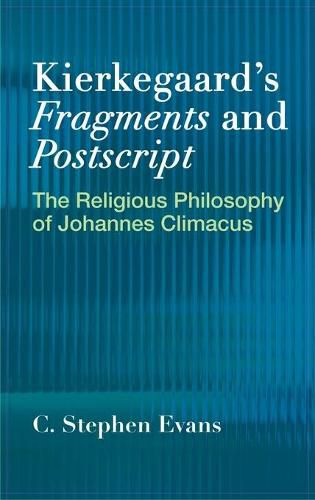Readings Newsletter
Become a Readings Member to make your shopping experience even easier.
Sign in or sign up for free!
You’re not far away from qualifying for FREE standard shipping within Australia
You’ve qualified for FREE standard shipping within Australia
The cart is loading…






Evans’ analysis of Kierkegaard’s Philosophical Fragments and Concluding Unscientific Postscript introduces even the nonspecialist to two of Kierkegaard’s most challenging works without minimizing the complex nature of his philosophy. Evans honors Kierkegaard’s wish not to be confused with his pseudonyms and so frames the discussion around the thoughts of Johannes Climacus. Yet, Evans highlights the similarities between Climacus’ and Kierkegaard’s ideas while setting them in conversation with contemporary philosophers and theologians.The book is divided into thirteen chapters. The first three set up the book with an introduction to Kierkegaard’s pseudonymous literature as a whole, an overview of Fragments and Postscript, and a discussion of the character and views of the Johannes Climacus pseudonym. The next nine chapters delve into specific pairs of concepts such as existence and the ethical, truth and subjectivity, and irony and humor. Evans also explores concepts that illuminate immanent or natural religion, as well as Christianity, understood as a transcendent religion grounded in a special revelation. Throughout, there is a revealing look at the roles objectivity and subjectivity play in human existence. Evans concludes his work with a consideration of Climacus’ voice that opens the door for readers to make their own interpretations and contributions to the conversation. A careful and lucid guide, Evans’ book is a key companion to Kierkegaard’s philosophical writings.
$9.00 standard shipping within Australia
FREE standard shipping within Australia for orders over $100.00
Express & International shipping calculated at checkout
Evans’ analysis of Kierkegaard’s Philosophical Fragments and Concluding Unscientific Postscript introduces even the nonspecialist to two of Kierkegaard’s most challenging works without minimizing the complex nature of his philosophy. Evans honors Kierkegaard’s wish not to be confused with his pseudonyms and so frames the discussion around the thoughts of Johannes Climacus. Yet, Evans highlights the similarities between Climacus’ and Kierkegaard’s ideas while setting them in conversation with contemporary philosophers and theologians.The book is divided into thirteen chapters. The first three set up the book with an introduction to Kierkegaard’s pseudonymous literature as a whole, an overview of Fragments and Postscript, and a discussion of the character and views of the Johannes Climacus pseudonym. The next nine chapters delve into specific pairs of concepts such as existence and the ethical, truth and subjectivity, and irony and humor. Evans also explores concepts that illuminate immanent or natural religion, as well as Christianity, understood as a transcendent religion grounded in a special revelation. Throughout, there is a revealing look at the roles objectivity and subjectivity play in human existence. Evans concludes his work with a consideration of Climacus’ voice that opens the door for readers to make their own interpretations and contributions to the conversation. A careful and lucid guide, Evans’ book is a key companion to Kierkegaard’s philosophical writings.